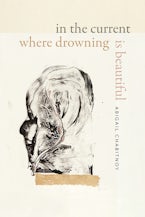- Home
- Wesleyan Poetry Series
- poetry
- literary collections
- social science
- In the Current Where Drowning Is Beautiful

A poetic re-visioning of narratives of violence against women and nature
In the Current Where Drowning Is Beautiful is a meditation on water, land, women, and violent environmental changes as they affect both the natural world and human migration. The poet reckons with the unsettling realities that women experience, questioning the cause and effect of events and asking why stories of oppression are so often simply accepted as the only stories. Alutiiq language is used throughout these poems that are in conversation with history, ancestors, and an uncertain future, in imagery that moves in waves, returning again and again to the ocean, and a deep visioning of the "current."
Excerpt from IN THE FIELD
They asked me if I was a citizen.
They wanted to know what I had seen/
I had heard/
this was only a test:
Look at the mark and tell them what you see.
[...]
CONTENTS • Signs You Are Standing at the End • In the Field • A Persistent Dream of Large • Bodies of Water • Anatomy of a Wave • All the Daughters • In the Current Where Drowning Is Beautiful • Supplemental Enrichment Curriculum • If Not Seed • If a Field • Light Triptych • Kingugturningaitua • Baptism by Fire • Camouflage, Defense, and Predation Being Among the Reasons • Holes in the Field • When You Say the Deer Swept Out to Sea Was 'Saved' • How About a Unicorn Horn? • If You're Going to Look Like a Wolf They Have to Love You More Than They Fear You • Swell • Quliyangua'ucikamken • Redirection With My Dead Relatives • She Is Making Rope • How It Goes • She Thought This Might Be How It Ends • The Word of the Week Is Wave • I Too Grow Tired of the Plot • A Four-Part Apology for My Continued Being • Uriitarsurciqua • The Usual Mix of Dismal News • It's Hard to Signal My Distress With Hands Around My Neck in Every Dream • The Media Would Like to Tell Me the Color of My Fish Tail on Another Day for Wearing Red • Palinode • When You Can't Throw All the Men into the Ocean and Start Over • Sea Change • Use That Which Is for Emptying • If a Liability of Your Own Making • Six Lines for Christine • Letter to the Daughter I Would Have Liked to Have • Notes • Acknowledgments
ABIGAIL CHABITNOY (Amherst, MA) is a Koniag descendent and a member of the Tangirnaq Native Village in Kodiak, Alaska. Her first book, How to Dress a Fish, won the Colorado Book Award in the Poetry category and was shortlisted for the Griffin International Poetry Prize. She is an assistant professor at UMass Amherst.
"This remarkable book undertakes a kind of geological exploration of the hidden-in-plain-sight strata making up the world around us and our lives within it: raspberries against graves against glaciers; disappeared women alongside disappearing rivers; mythic transformations next to anonymous martyrdoms. Connecting it all are stories—the questions they ask and answer, what they reveal or obscure—and water—as source of life and death, body of history and place where history's bodies are buried, manifestation of the cross-currents that swirl through and around us, bellwether of what's to come. Chabitnoy invites us into a dazzling, urgent mode of inquiry in which poems—keen and liminal, epic and intimate, fierce and tender—are the conscious element depositing us wide-awake on the shore of the precarious present we inherit and inhabit where, increasingly, 'the high ground isn't.'"
~Lisa Olstein, author of Late Empire
"In the Current Where Drowning is Beautiful will sweep you up and subdue you. Chabitnoy powerfully and lyrically addresses the crisis of violence against Indigenous women, giving voice to those who have been silenced. This is a timeless and important work."
~Rena Priest, Washington State Poet Laureate, 2021-2023
"Current is a deeply challenging work, whose layers, when peeled back, reveal the intersection of past and present—how oppression and violence are still just as mythic in their proportions now as they have ever been."
~Krysia Wazny McClain, Colorado Review
"...in this remarkable collection, Chabitnoy shows ways of subverting hegemonic structures in language, text, body, and land—vital, necessary ways that make it possible to find and reclaim voice and life itself."
~Lucien Darjeun Meadows, Seneca Review
